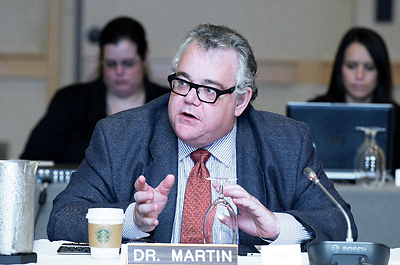Trustees Address Pending MH Legislation, Endorse Several Position Statements
Abstract
The APA Board of Trustees examines factors that are poised to change the way many psychiatrists practice their specialty.
Especially prominent on the agenda at the July meeting of the APA Board of Trustees were issues concerning the ways in which changes in the health care system have had an impact on psychiatric practice or are likely to do so in the near future.

Speaker-elect Glenn Martin, M.D., participates in a discussion about the recently enacted psychologist prescribing law in Illinois.
One bill (HR 3717) introduced in Congress by Rep. Tim Murphy (R-Pa.), for example, addresses several aspects of mental health care. While APA supports most of the bill (Psychiatric News, April 25), which is designed to expand access to mental health care, funnel more money to psychiatric research, expand telepsychiatry, and improve coordination of federal mental health programs, among other provisions, the Board approved several proposals from the APA Council on Advocacy and Government Relations that APA would like to see included in the bill.
Among the suggested changes were ones that would ensure that mental health and substance abuse remain together in the Substance Abuse and Mental Health Services Administration, require annual reporting by the Department of Health and Human Services on parity-law inquiries and complaints, codify HIPAA changes affecting confidentiality of patient mental health records, and include funding for early-intervention programs, specifically citing the American Psychiatric Foundation’s school-based “Typical or Troubled?” project and its Judges Leadership Initiative.
The Board also discussed development of a public-policy statement on “how and where psychiatry fits into each of the new models of care, as well as psychiatry’s clinical roles and responsibilities within each model.” The Board will hold follow-up discussions on a policy statement related to new models of care at a future meeting.
Board members also voted to approve several position statements that had previously been endorsed by the Assembly, including one titled “Psychotherapy as an Essential Skill of Psychiatrists.” The statement emphasizes that “APA advocates for psychotherapy to remain a central treatment option for all patients and for psychotherapy (alone or as part of combined treatment) by psychiatrists to be reimbursed by payers in a manner that integrates care and does not provide financial incentives for isolating biological treatments from psychosocial interventions. . . .” It points out as well that “APA supports the ACGME/RRC in their continued accreditation requirement that psychiatry residency training programs provide comprehensive training in evidence-based psychotherapies, as well as in collaborative treatment models.”
Prior authorization for psychotropic medication is the topic of another position statement approved by the Board. It puts APA on record opposing any requirements that psychiatrists must get approval to prescribe a psychotropic medication prior to payment by insurers, “except for instances of clear outlier practices or an established evidence base that implicates concern for patient safety.”
The third approved position statement involves health and safety concerns raised by laws that legalize marijuana use. It says that APA “strongly urges Congress and the President to direct the departments of Justice and of Health and Human Services to establish coordinated, interagency mechanisms to monitor and measure the health and safety consequences of policies enacted by states that legalize cultivation, distribution, and possession of marijuana for medical or recreational use and to fund relevant research.” APA wants particular attention paid “to states that legalize recreational use and to the effects of medical legalization on the prevalence and consequences of recreational use, especially among children and adolescents.”
The Board also voted to increase to $40,000 APA’s support of the organization PsychSIGN for 2015, a $5,000 increase over 2014. Members of PsychSIGN (Psychiatry Student Interest Group Network) are medical students interested in psychiatry, ranging from those with some interest in the field to those already in the process of applying to psychiatry residencies. The group provides its members with mentoring opportunities and resources. ■
More photos from this event can be accessed here.



